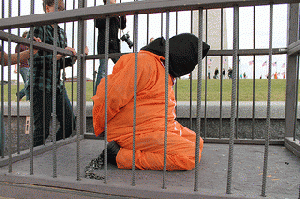91.SilentMarch.WitnessAgainstTorture.WDC.7January2012 by Elvert Barnes
Consent is a slippery thing. If you look inside, there's a little ball of trust. When you give your consent about something to a person, company or government, you are entrusting a portion of your power to them, with the unspoken understanding that they will honor that trust. Unfortunately, it doesn't always turn out that way.
I'm currently working on the 7th and final installment of a series of short stories that I began last year which explores the idea that any time you refrain from speaking out against an insult or injustice, the perpetrator gains a little confidence, and you lose it. (You can read these and my other stories here at OEN or on my WordPress blog.) By not speaking out, you consent to the perpetrator's actions, empowering them to go further the next time. This is the essence of how the world has come to be the way it is. Give them an inch, and they'll take a mile.
Anyone who has ever worked on a poorly controlled fixed-price project is aware of mission creep. You start off confident that you can accomplish what you had agreed to do in the time allotted, and within the budget that had been agreed to. But somewhere along the way, you're asked to do one small thing beyond the scope of the plan, and you accede to the request without renegotiating the cost of the work. You consent to the change because you trust your customer to honor the original agreement. You tell yourself that it's just one small thing, and let it go at that. But the damage has already been done. Your trust has already been violated. And because you have agreed to it, your customer becomes that much more confident that they can ask for another change, and then another, and another. Meanwhile, you have been diminished. Your own confidence has eroded, and you are less likely to object to their next request, simply because you had agreed to this one.
The art of negotiating is a dance of consent. In theory, each party attempts to get the other to consent to something beyond what they had initially agreed to, in exchange for ceding something else. In practice, however, one side often comes to the dance floor with more power than the other, and the dance becomes an assault. This is why negotiating with a company or a government is frequently a lost cause. They have more power than you do, and are confident that you will consent to a bad deal. But they got that power from us, and they can only keep it if we allow them to.
You can start by recognizing all of the ways in which you have ceded power to others, because they were each accomplished by getting your consent, and it's not always done consciously. For example, if you've ever created an account for using a website such as OEN, you have to agree to the terms of a contract that you are unlikely to ever read. If you trust that the people behind the site, like Rob Kall at OEN, will honor the trust that you have placed in his creation, then it's no big deal. But how many websites have you registered at where you don't know the intentions of the owners? You may get angry when you learn that a site turns around and sells information about you to other companies, but you consented to it blindly. And when they later ask for your consent to changes to that agreement, you blithely click your consent, without knowing what else you have agreed to.
But companies are not the only powerful entities that are collecting and using information about you. And that's where Edward Snowden drew the line, when he learned that the US government was violating the trust of its citizens by spying on them. Such spying was itself a violation of the contract that the citizens have with their government, the Constitution upon which that government was based. You're even being taken advantage of by the way it has been described by the government and parroted by the complicit media. Sure we were spying on you, they say, but we're only using 'metadata' -- the record of who you called, emailed and texted, and not the content of those messages. But the truth is that there's more value in knowing the network of connections that this metadata creates than there is in the written or spoken conversations themselves, because the network map tells them who the influential people are, and which ones are likely to cause trouble by spreading dissent. They're relying on your ignorance to protect their power over you.
Whistleblowers, such as Daniel Ellsberg, Bradley Manning, and now Edward Snowden, took huge personal risks to lift the curtain of secrecy and reveal the ways in which the US government had violated our trust, the law and the constitution through power that had been taken without consent. Such revelations threaten to undermine the government's illusion of power over us that keeps the citizens from revolting. To protect that illusion, the government, and the corporations that control what it does, attack not only the whistleblowers themselves, but journalists, such as Glenn Greenwald, who have the integrity to serve the people rather than those in power.
So we find ourselves beset by a two-headed monster. On one side, there's the Government. It has betrayed our trust, against the best efforts of the few, such as Senator Bernie Sanders and Congressman Alan Grayson, who have railed on our behalf. And on the other side are a group of multinational corporations, controlled by a small number of obscenely wealthy people, who are doing their best to extract whatever is to be had from us. It's been said that communication is only possible among equals. Governments negotiate with other governments, and corporations negotiate with other corporations, but now the two factions are dissolving into one another. Michigan's state government has turned control of some cities over to corporate masters, voiding the citizens' relationship with their elected city governments, and nullifying the guarantees of the Constitution. And ALEC has been dictating what becomes law, pushing corporate rule further and further into the lives of the people.
It's all a nice fantasy for those in government and business who dream of power, but it can't last. It's not sustainable. It makes faulty assumptions about the basis for all of that accreted power. Every one of us is living through a grand narrative in which the powerful have reached the limits of power, and the world is being transformed. Rob Kall talks about it all the time: bottom-up power. Howard Zinn showed us that history is made by the small acts of multitudes, rather than the stories of powerful individuals we are force-fed in school.
And sometimes, those small acts of multitudes are inspired by someone who doesn't even rise to speak, but instead plants subversive thoughts in the minds of their readers. A recent example is the book and movie, "Cloud Atlas", which showed how we are all connected, not simply across distance, but across time as well. As the author, David Mitchell, said through his character Sonmi, "Our lives are not our own. We are bound to others, past and present, and by each crime and every kindness, we birth our future."
For us, though, the question is how do we do it. What small act can I do that will resonate with the multitudes to transform the world? The idea of speaking truth to power sounds fine, but what truth, and to whom do I speak it?
In 1951, Eric Frank Russell published a short story called "And Then There Were None". His story was about a space expedition from Earth that encountered a world that had been settled a long time earlier by a community that did not accept the need for centralized power. It had developed customs and traditions from that, which included the idea of exchanging 'obs' or obligations with one another in exchange for helping one another out. The expedition didn't understand how a society without powerful leaders to control it could exist, and sent out one man to find out more. Time and again, people referred him to a simple sign that read 'FIW', and told him is was the ultimate weapon. Against it, no power could prevail. Any time the leader of the expedition attempted to force the people to do something, they stood fast, refused to comply, and said, "FIW". That one man eventually discovered the secret, and joined the people's opposition to the expedition's attempt at control. Then, one by one, the rest of the expedition followed suit, until there was nobody left to claim power over them.
Russell's secret was wrapped up in a simple phrase: Freedom - I Won't. In other words, Freedom is the ability to stand before such power and declare 'I Won't' consent. Spread the word. FIW!
--- P. Orin Zack






